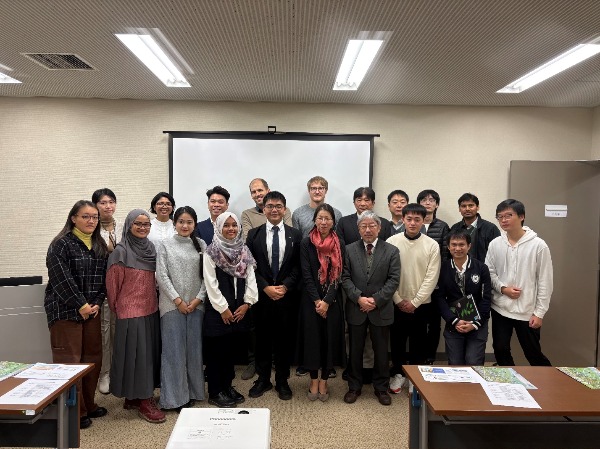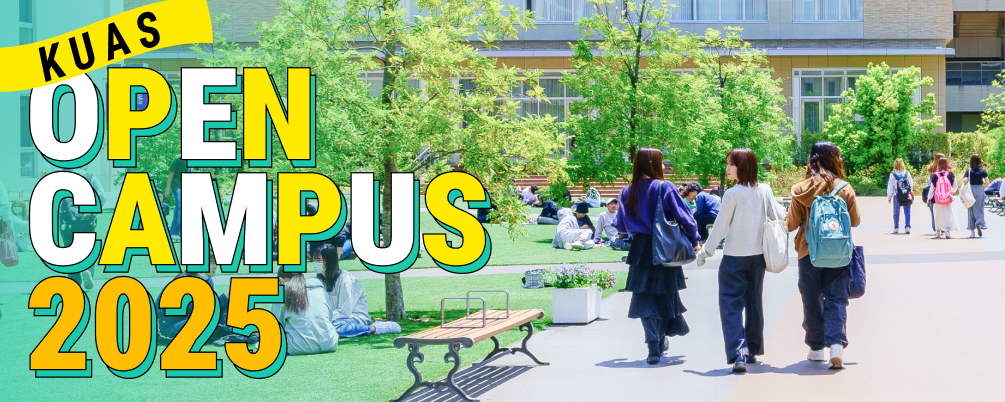
11月26日(火)、本学 バイオ環境学部は、「第1回関西および東南アジアにおけるメタンの意識向上およびモニタリング会議」を開催しました。国際的枠組み「Global Methane Pledge(GMP)」では、地球温暖化に大きな影響力がある温室効果ガスの1つであるメタンの世界全体の排出量を2020年比で30%削減するという目標が掲げられ、賛同国がその取り組みを進めています。この様な状況を受け、本イベントでは、メタン排出における循環型経済の実践に関する喫緊の課題や革新的な解決策について、地域単位だけでなく国際的な視点を専門家たちと共有し、検討しました。
冒頭、本学副学長兼バイオ環境学部長の三村徹郎教授が開会の挨拶を行いました。三村教授は、本会議への参加を歓迎するとともに、気候変動対策におけるメタン削減の戦略的重要性に触れ、また、本会議が世界と地域社会の双方に効果をもたらす実践的な識見と実効可能な解決策を生む出発点となることに期待していると述べました。
講演要旨
1. Dr. Bertrand Rouet-Leduc (京都大学助教)
世界のメタン検出のためのAIと複数波長衛星観測技術の応用について紹介されました。パーミアン盆地などの埋立地や石油・ガス生産地域に焦点を当て、年間10万件以上の排出イベントが特定されました。将来的には、検出精度を向上させ、この手法を業界全体に拡大することを目指していることも報告されていました。
2. Dr. Helena Varkkey (Universiti Malaya准教授)
GMPの枠組みの中でマレーシアのメタン排出量の分析について紹介されました。メタン排出はマレーシアの温室効果ガス総排出量の15%を占めており、その大部分は石油・ガス産業とパーム油産業によるものであることが報告されていました。国家的なメタン行動計画の欠如と、監視・報告・検証(MRV)システムの改善が指摘されました。さらに、メタン削減がもたらす2つのメリットである環境改善と公衆衛生の向上についても強調されていました。
3. Dr. Matthew Ashfold (University of Nottingham Malaysia准教授)
マレーシアにおけるメタン排出データと政策の課題について報告されました。国内インベントリとIEAのような国際的なデータセットとの不整合が浮き彫りにされ、精度を高めるためには衛星観測などのトップダウンと現場測定などのボトムアップの統合的なアプローチが提唱されました。また、メタン削減戦略の費用対効果と、GMP目標を達成するための透明性の高い報告の必要性について述べられました。
4. Miss Adelia Anju Asmara (Universitas Islam Indonesia助教)
インドネシアにおける廃棄物や石炭採掘の実情からメタン削減戦略が紹介されました。廃棄物からエネルギーへの転換施設やメタンのモニタリングシステムなどの導入は、2030年までに排出量を30%削減するというインドネシアの目標と合致しています。進捗を加速させるためにも、強固な政策の枠組みや能力開発、先進技術の導入の重要性が指摘されました。
5. Dr. Huynh Tan Loi (Van Lang University講師)
ベトナム ハノイ市の浄化槽のメタン排出に関する分析が紹介されました。浄化槽の嫌気性消化が大きな原因であり、貯留期間が長いほど排出量が増加することが指摘されました。定期的なメンテナンスの実施が、効果的な温室効果ガス削減と汚染物質の除去効果向上に寄与することが提言されました。
閉会式では、本学 バイオ環境デザイン学科長である鈴木玲治教授が、今回の議論は気候変動対策およびメタン削減に関するより強固な連携の出発点と位置づけられ、今後の協力関係と進展への期待を述べました。また、これらの取り組みを達成するためには、学術界、産業界、政策立案者が協働することの重要性を合わせて強調しました。
本会議は、革新的技術の組み合わせやデータ透明性の向上、産業横断的な連携の促進をすることで、メタン削減という取り組みが持続可能で環境に優しい未来に向けた好機として捉えることが可能であることを示しました。また、気候変動に対して強靭な社会を構築するためには、関係者間のより一層の協力関係が必要不可欠であることが再認識されました。
(バイオ環境学部 講師 坊安恵 / 講師 Wong Yong Jie)
Methane Matters: Innovating for a Greener Tomorrow
Methane , one of the most potent greenhouse gases, presents significant opportunities for targeted reductions. As part of the Global Methane Pledge (GMP), nations are working to cut methane emissions by at least 30% by 2030. Recognizing the urgency, Dr. Wong Yong Jie and Dr. Yasue Bo from the Faculty of Bioenvironmental Science at Kyoto University of Advanced Science (KUAS) hosted the 1st Kansai Japan and Southeast Asia Methane Awareness and Monitoring Roundtable Discussion. This event brought together experts and leaders to address pressing challenges and innovations in methane mitigation, as well as explore circular economy practices.
Opening Remarks
The event opened with an inspiring address by Prof. Dr. Mimura Tetsuro, Vice President and Dean of the Faculty of Bioenvironmental Science at KUAS. Prof. Mimura warmly welcomed participants, emphasizing the importance of tackling methane emissions in the broader fight against climate change. He expressed optimism that the discussions would yield practical insights and actionable solutions to benefit both global and local communities.
Speaker Highlights
1. Dr. Bertrand Rouet-Leduc (Assistant Professor– Kyoto University)
Bertrand showcased the application of AI and multispectral satellite techniques for global methane detection. His approach has identified over 100,000 emission events annually, focusing on sources such as landfills and oil fields in areas like the Permian Basin. Looking forward, he aims to enhance detection precision and expand the methodology across industries.
2. Dr. Helena Varkkey (Associate Professor – Universiti Malaya)
Helena analyzed Malaysia’s methane emissions within the GMP framework. Methane contributes 15% of Malaysia’s total greenhouse gas emissions, largely from oil and gas and palm oil industries. She underscored the absence of a national methane action plan and advocated for improved Monitoring, Reporting, and Verification (MRV) systems. Additionally, Helena also highlighted the dual benefits of methane reduction, including better environmental outcomes and public health improvements.
3. Dr. Matthew Ashfold (Associate Professor – University of Nottingham Malaysia)
Matthew addressed the challenges of methane emissions data and policy in Malaysia. He highlighted discrepancies between national inventories and international datasets such as the IEA, advocating for integrated top-down (e.g., satellite) and bottom-up approaches to enhance accuracy. Matthew emphasized the cost-effectiveness of methane reduction strategies and the need for transparent reporting to meet GMP goals.
4. Miss Adelia Anju Asmara (Junior Assistant Professor- Universitas Islam Indonesia)
Anju shared Indonesia’s strategies to mitigate methane emissions from waste and coal mining. Initiatives such as waste-to-energy plants and methane monitoring systems align with Indonesia’s goal of reducing emissions by 30% by 2030. She stressed the importance of strong policy frameworks, capacity building, and the adoption of advanced technologies to accelerate progress.
5. Dr. Huynh Tan Loi (Senior Lecturer- Van Lang University)
Loi examined methane emissions from septic systems in Hanoi Vietnam. He found that anaerobic digestion in septic tanks is a significant source, with prolonged storage periods increasing emissions. Loi recommended regular maintenance of septic systems to effectively reduce greenhouse gases and enhance pollutant removal for environment protection.
Closing Remarks
The event concluded with a forward-looking message from Prof. Dr. Suzuki Reiji, Head of Bioenvironmental Design of KUAS. Prof. Suzuki described the discussion as a starting point for deeper collaborations on climate change and methane mitigation. He expressed optimism for future partnerships and emphasized the critical role of shared efforts among academia, industry, and policymakers in achieving meaningful progress.
Takeaway
This roundtable highlighted the urgent need for collective action to mitigate methane emissions. By combining innovative technologies, enhancing transparency, and fostering cross-sector partnerships, we can transform challenges into opportunities for a sustainable and greener future. This event marks the beginning of impactful collaborations toward a more climate-resilient world.




